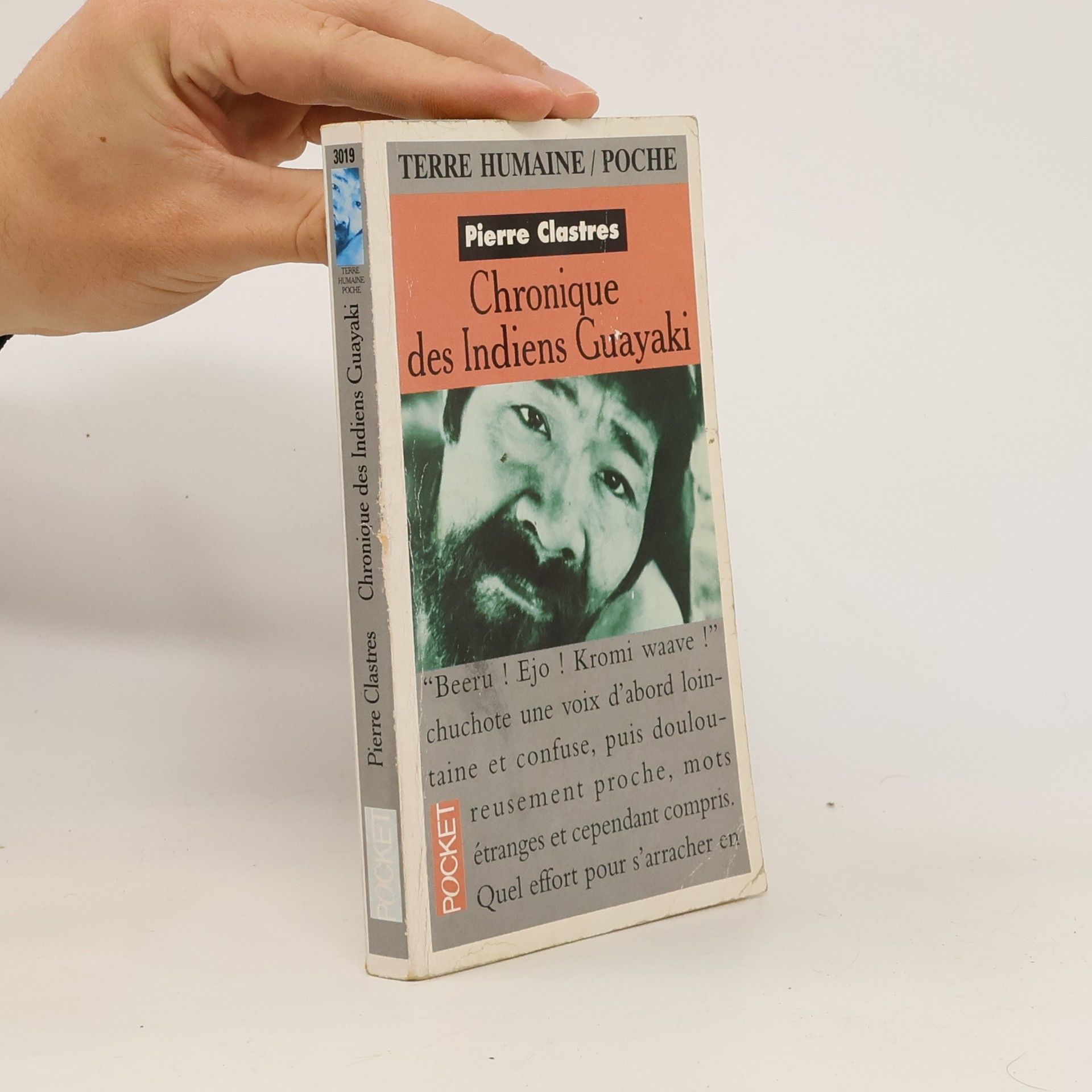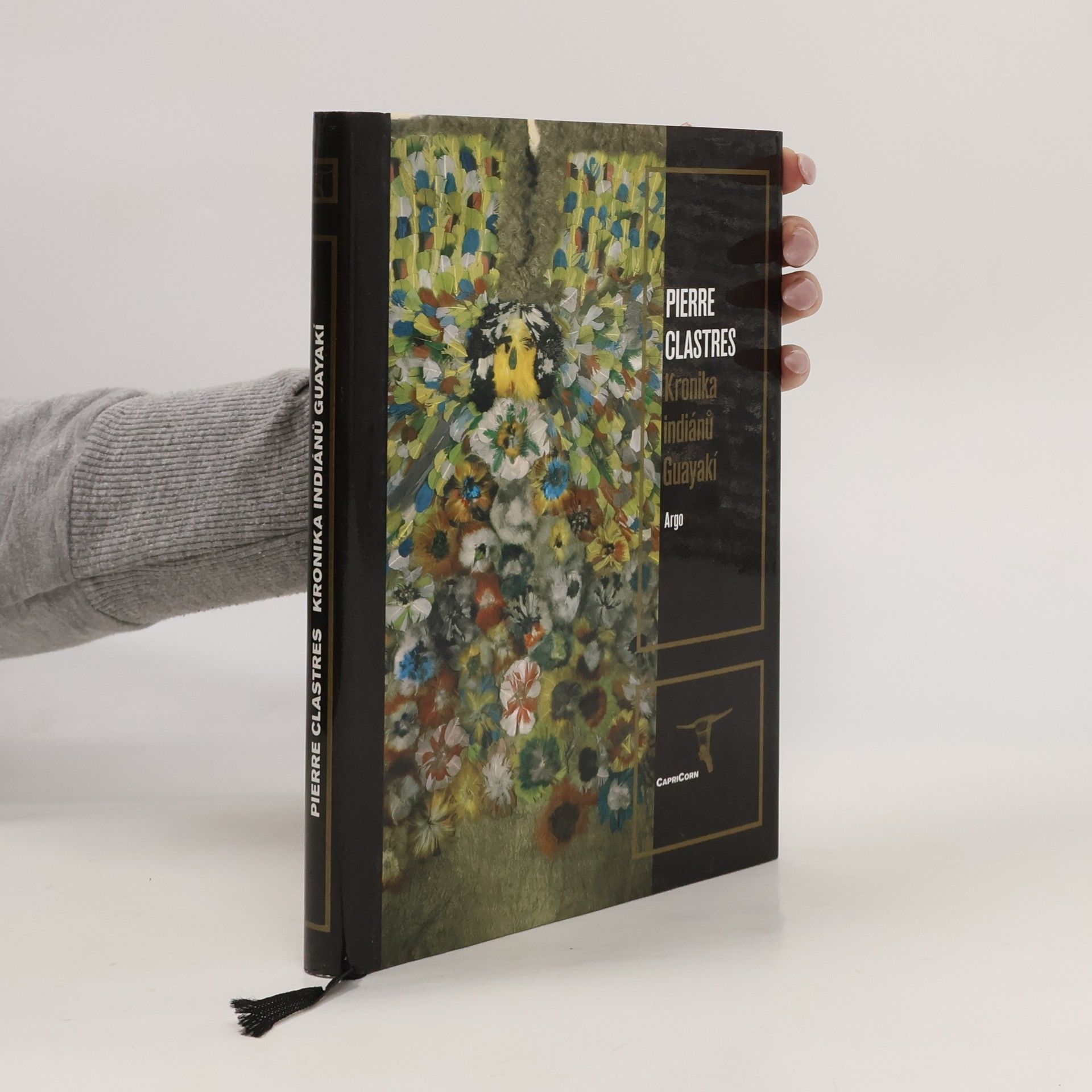Duchovní svět indiánských kočovníků očima francouzského etnologa. Autor, přední znalec araguayských kultur, strávil rok na východě země mezi příslušníky kmene Guayaquí a o svém pobytu napsal mimořádně výstižnou knihu. Všímá si v ní všech aspektů života zmíněného společenství, od narození dítěte až po projevy kanibalismu. Hluboký psychologický vhled se prolíná s líčením materiálních podmínek života kmene.Perokresby v textu.
Pierre Clastres Knihy
Pierre Clastres bol francúzsky antropológ a etnograf, ktorý sa preslávil svojím terénnym výskumom medzi indiánmi Guayaki v Paraguaji a svojou teóriou o bezštátnych spoločnostiach. Vo svojom najznámejšom diele kritizuje evolučnú predstavu, že štát je konečným cieľom všetkých spoločností, aj rousseauovský mýtus o vznešenom divochovi. Tvrdil, že túžba po slobode je v ľudskej prirodzenosti, a preto sa spoločnosti organizujú pomocou zvykov, ktoré aktívne bránia vzniku despotickej moci. Štát vníma ako špecifickú hierarchickú mocenskú štruktúru, ktorá sa objavuje v spoločnostiach, ktoré stratili mechanizmy brániace oddeleniu moci od spoločnosti. Jeho teória tak predstavuje kritiku marxistického ekonomického determinizmu, pretože Clastres považoval politiku za autonómnu sféru, ktorá v bezštátnych spoločnostiach aktívne bráni vzniku autority.







Archeology of Violence
- 335 stránok
- 12 hodin čítania
Review: "The War machine is the motor of the social machine; the primitive social being relies entirely on war, primitive society cannot survive without war. The more war there is, the less unification there is, and the best enemy of the State is war. Primitive society is society against the State in that it is society-for-war." Anthropologist Pierre Clastres significantly influenced Gilles Deleuze and Felix Guattari's Anti-Oedipus and contributed to political anthropology. The posthumous publication of Archeology of Violence in 1980 compiled Clastres's final essays and the opening chapters of a book he began before his death in 1977. Building on his earlier work, Society Against the State, Clastres critiques his mentor, Claude Levi-Strauss, and challenges Marxist anthropology and other Western models of "primitive societies." He rejects the notion that violence among South American Indians stems from resource scarcity, instead arguing it serves as a deliberate strategy for territorial segmentation and preventing State formation. By intertwining the political and social spheres and ensuring tribal chiefs remain dependent on their communities, the "savages" Clastres describes emerge as astute political actors who preemptively resist globalization efforts.
Society Against the State
- 218 stránok
- 8 hodin čítania
In this landmark text in anthropology and political science, Pierre Clastres offers examples of South American Indian groups that, though without hierarchical leadership, were both affluent and complex.
Chronicle of the Guayaki Indians
- 352 stránok
- 13 hodin čítania
The narrative captures Clastres's initial fieldwork in the 1960s, detailing his interactions with the Guayaki Indians, a distinctive tribe from Paraguay that has since disappeared. Through vivid observations, the book explores their culture, social structure, and way of life, offering a poignant glimpse into a world that has been lost to time. Clastres's anthropological insights highlight the complexities of the Guayaki's existence and their relationship with the surrounding environment.
On les appelle Guayaki, « Rats féroces ». Eux-mêmes se dénomment Aché, « les Personnes ». Silencieux et invisibles, ces nomades parcourent la forêt tropicale à l'est du Paraguay. C'est ce qui leur a permis d'échapper si longtemps au sort de leurs voisins sédentaires : esclavage, mort, disparition. L'auteur a vécu un an dans leur intimité... Les incidents et anecdotes cocasses ou tragiques tracent peu à peu le portrait de ces Guayaki, paillards quand ils peuvent, graves lorsqu'il le faut : fêtes du miel, de l'amour, conflit au sein des bandes, meurtres, sacrifices, anthropophagie (ils se libèrent de leurs défunts en les mangeant). À la douceur succède la cruauté. Cette culture disparue repose sur la fidélité des Indiens à leurs anciens rites, et, au-delà, aux mythes de leur origine et de leur destin, qui suscitent en nous d'étranges échos. Ce livre est une chronique qui n'esquive aucun des problèmes que pose à l'ethnologie cette population indienne. De l'écologie très particulière d'une société de chasseurs à la logique la plus secrète de leur pensée, c'est le tout d'un univers culturel inconnu qui se révèle ici, sous le regard d'un des grands ethnologues français.
Archäologie der Gewalt
- 128 stránok
- 5 hodin čítania
Pierre Clastres untersucht die Rolle von Gewalt in primitiven Gesellschaften und deren Funktion zur Verhinderung der Entstehung eines Staatsapparates. Er argumentiert, dass Stammesgesellschaften Gewalt nicht nur als Teil ihrer Existenz akzeptieren, sondern sie systematisch einsetzen, um das "kalte Monster" des Staates zu vermeiden. Clastres widerlegt gängige Theorien, die Krieg als Ergebnis von Jagd oder misslungenen Handelsbeziehungen betrachten, und beschreibt stattdessen die primitive Gesellschaft als eine, die sich in einem ständigen Kriegszustand befindet.
Staatsfeinde
Studien zur politischen Anthropologie